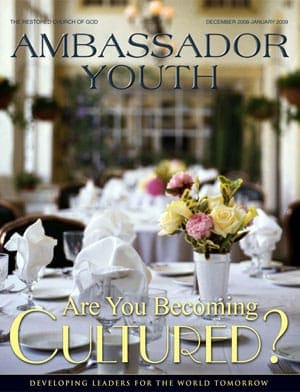You stare at the plate in front of you. The carefully placed silverware. The glass. The empty salad plate. The teacup. As you sit in the four-star restaurant, you try to hide your confusion about which fork is for salad, when to unfold your napkin and how to hold your soup spoon. A million other questions race through your mind. The meal looks and smells delicious, but, if asked, you would not be able to describe it. You notice classical music playing softly in the background, but are not sure exactly who composed it.
Have you ever been in this situation? A lack of knowledge about food, music, manners and other areas of a cultured education can nearly wreck a wonderful night at a concert with friends, or mar a fine dining experience during the Feast of Tabernacles.
Refining Your Tastes
What or who do you think of when you hear the word “cultured?” Do you call to mind a friend whose interest in art has led him to study the paintings of Rembrandt and Van Gogh? Does it remind you of an uncle who quotes Shakespeare? Or of your father, who takes pride in his carefully honed taste in wine? Do you think of fancy restaurants?
Cultured, as defined by the American Heritage Dictionary, is the quality of being “educated, polished, and refined.” It is having “a high degree of taste and refinement formed by aesthetic and intellectual training.” Random House Unabridged Dictionary adds, “…the quality in a person…that arises from a concern for what is regarded as excellent in arts, letters, manners, scholarly pursuits, etc…development or improvement of the mind by education or training.”
These definitions serve to illustrate the broadness—and importance—of this topic. They describe being cultured as general knowledge about the arts, not just about one specific topic. A cultured individual is one who has been educated in the above topics, and one who has trained himself to appreciate the finer things in life. Does this describe you?
You should care about becoming cultured. There are a host of benefits that flow from refining and developing your tastes. People will respect you more and think more highly of you. Expanding your knowledge about the world, including the past, will give you a broader perspective on life and the times in which we live. It is also important that, as a teenager growing up in God’s Church and striving to live His way of life, you are consistently growing in knowledge. The Bible speaks of this in many places.
Another benefit is that you will be able to share your information with others. You will enrich yourself as well as the lives of others by the knowledge you can give them.
But be careful of snobbery. Some who study an unfamiliar topic can start to think too highly of themselves. Be mindful of this pitfall. Do not let any of your newly discovered knowledge fill you with pride.
A Thousand Topics, One Day at a Time
The painter Claude Monet, the poet Robert Frost, the composer Frédéric Chopin and the author Ernest Hemingway are just a few of the famous individuals who have helped shape culture. Realize that there are reasons these individuals are popular. Find out why their works are considered classics.
Understand that studying all the classic literature, music and painters who have ever lived would take many lifetimes. Do not take on too many subjects. Focus on one area of art or music before researching other subjects. Otherwise, you could easily become overwhelmed by the amount of material that exists. This will result in the temptation to give up.
Do not let your quest for knowledge become more expensive than it needs to be. Be resourceful in finding ways to expand your fund of knowledge without spending a lot of money. However, realize that it will take work, and you must budget time for researching and becoming more cultured.
The following are a few tips to help you become more sophisticated.
- Become an avid reader: Reading is one of the best and most effective ways to become more cultured. Read newspapers and books. Read short stories. Read poetry and news magazines. Research classic literature or famous authors. Learn about different cultures, history and languages. Your local library should have whatever you are looking for. If not, ask if they will order it. Find lists of classic literature, which can be found online or at a bookstore. Be sure what you are studying is both edifying and wholesome.
- Listen to quality music: Do you appreciate good music—and if so, what kinds? Even if you cannot compose a dynamic piano sonata, it does not mean you cannot appreciate and learn to value beautiful music. Again, your library should have a huge selection of music. Vary what you listen to and broaden your musical horizons. There is much out there with which you are probably not familiar. For instance, jazz, classical and folk are but a few worthwhile genres.
- Learn to appreciate fine art: Do you recognize famous works of modern or classical painters? Take an interest in art. Visit museums in your area to learn more about a variety of artistic styles. These museums may offer free admission at least one day a week. Take advantage of these treasure troves of culture and history, even if you must travel to see them.
- Tutor your taste buds: Can you tell the difference between a cup of instant coffee and a freshly roasted, burr-ground cup of organic coffee? What about different teas? Teas taste good and have many tremendous health benefits. Challenge yourself to distinguish different flavors and spices in the entrées you eat. Spend time researching various types of cuisine. If hosting a dinner party, others will certainly appreciate the touch of class and quality you bring to the entrée, beverages or dessert.
Work hard to expand your knowledge in these areas, and learn to distinguish higher quality items from less than quality.
Living a Cultured Life
One of our main goals in life, besides building character, is to become a well-rounded person. This is one of the main purposes of Ambassador Training Center, to produce interesting and balanced people (Phil. 4:5). We should always be striving to expand our fund of knowledge and better ourselves, mentally, socially and spiritually.
Take your education into your own hands. Actively strive to round out your personality and increase your fund of knowledge. Do not wait for others to teach you—teach yourself! Make it fun and exciting. Do not be afraid to try something new, whether Japanese sushi or Latin American ceviche. It is easy to become stuck doing, eating and listening to the same things over and over again, but there is truth to the saying, “Variety is the spice of life.”
If you apply the tips found in this article, you will be well on your way to becoming a more cultured individual.
















